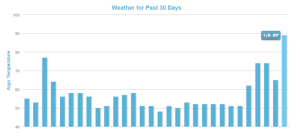Several online tracking tools have recently reported major fluctuations in the search rankings:
What was speculated to be a Penguin update was actually a core algorithm update as confirmed by Gary Illyes, webmaster trends analyst at Google.
Updates are nothing new of course as the search giant frequently updates its ranking algorithm to deliver more relevant results. But the latest update may be different now that Panda is integrated into Google’s core algorithm. The news was first reported by Jennifer Slegg who had received confirmation directly from Google:
“Panda is an algorithm that’s applied to sites overall and has become one of our core ranking signals. It measures the quality of a site, which you can read more about in our guidelines. Panda allows Google to take quality into account and adjust ranking accordingly.”
Google Panda was originally rolled out in early 2011 to penalize sites deemed as low quality and return more relevant sites in the search results. With the recent announcement, we now know that Panda is no longer its own separate algorithm but integrated into the core algorithm itself. Previously, Panda updates would roll out slowly and be announced by Google. But this will no longer be the case so more frequent rises or dips in rankings can be expected based on site content.
The recent changes naturally raise several important questions.
If your site starts to dip in rankings, is it because the content is deemed as low quality? Is the penalty due to spammy links or other ranking signals in the core algorithm? The answers are still not exactly clear as it could be a combination of factors that have led to a ranking penalty. But core updates are expected to occur more frequently which only means one thing.
Quality Content Matters More Than Ever
Search engines are used to find content, that much is obvious.
But the quality of the results can be easily compromised by spammers and webmasters using questionable tactics such as keyword spamming to manipulate rankings. Panda was initially released to weed out poor quality content from the search results and return more relevant sites for each search query. Now that Panda is part of the core algorithm, quality content is more important than ever.
The days of simply putting up hundreds or thousands of pages and bringing in immediate search traffic are over. Google now looks at numerous factors from domain authority to backlinks and bounce rates to assess content quality.
The recent implementation means that those sites that already produce great content can expect to retain their rankings and even see an increase. But those sites with low quality or spammy content can expect to be hit hard. So does this mean you should completely overhaul all existing pages on your site?
Not necessarily.
If you have already been focusing on quality content, you likely won’t need to do anything else. Google has always maintained that webmasters should focus on quality, not quantity and deliver content that comprehensively covers the topic at hand. This will be even more important now that Panda is deeply integrated in core updates.




